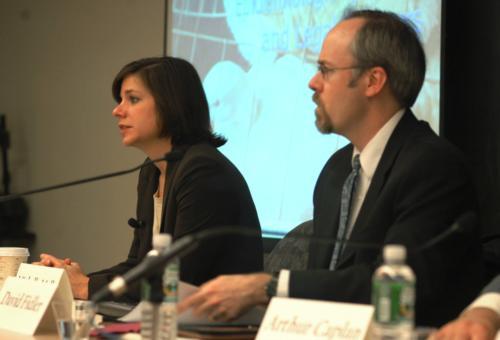
News
Cambridge Residents Slam Council Proposal to Delay Bike Lane Construction

News
‘Gender-Affirming Slay Fest’: Harvard College QSA Hosts Annual Queer Prom

News
‘Not Being Nerds’: Harvard Students Dance to Tinashe at Yardfest

News
Wrongful Death Trial Against CAMHS Employee Over 2015 Student Suicide To Begin Tuesday

News
Cornel West, Harvard Affiliates Call for University to Divest from ‘Israeli Apartheid’ at Rally
Profs: Prepare for Pandemic

The early bird doesn’t get the flu.
That is why countries need to plan and prepare for the possibility of a pandemic, and these plans and preparations should include not just contingency plans but also address the ethical and legal issues beforehand, said professors in a panel at Harvard Law School (HLS) yesterday.
Attracting a crowd of around 40 people, three prominent law professors on the panel explored the intersection of law, ethics, and public health in policies to address a public health crisis, such as an avian flu outbreak.
David Fidler, a law professor at Indiana University and a past consultant for the World Health Organization, focused on the framing of public health concerns, particularly the spread of pandemics, as national security threats.
He said that while linking public health to security may increases the political importance of the former, it may also result in diverting resources from developing countries, which are most vulnerable to pandemics, to developed countries.
Fidler cited the United States spending more on preventing domestic bioterrorism than on combating AIDS in Africa as an example.
While Fidler focused on the politics of public health issues, another panelist explored the moral tenets of policy making.
Arthur Caplan, a bioethics professor at the University of Pennsylvania, said that justice and fairness should be the guiding principles in making public health policy.
He used personal anecdotes to suggest that there is currently “no strategy, according to any principle, to distribute health care resources, in the face of avian flu.”
“Even if we have a plan, it’s not widely revealed,” he said, describing informal surveying among Pennsylvania residents that showed they did not know where to go for vaccination in the event of an avian flu outbreak. Caplan said that the way transplants are currently conducted may provide lessons on how to make pandemics-related policy just and fair.
He said that the public understands the limited availability of organs for transplant and the rules of distribution, while arrangements for the allocation of avian flu vaccinations are not as clear or well-understood.
Daniel Markovits, an associate professor at Yale Law School, explored what restrictions on individual liberty, in the event of a public health crisis, are legally and morally tolerable.
He discussed the “prioritarian” approach to distributive equality of medical resources, which aims to minimize the greatest individual burden associated with disease.
“It is easier to spread the burden before diseases than after,” he said. “Now, before the disease, we have strong distributive-justice reasons to invest extensively, including inefficiently.”
“If we don’t make investment, we’re like losing gamblers [because we live in a] society that gambles that pandemics won’t happen,” he said.
He suggested preemptive actions and measures such as quarantines with humane conditions.
The audience members praised the interdisciplinary nature of the panel.
Eric R. Benson, a second-year HLS student who attended the event, said “a lot of people tend to specialize in different perspectives on the same issue. It’s when we bring people together and hear these different perspectives that we get a lot out of [the discussion].”
The panel was sponsored by an interdisciplinary research program launched last year at HLS, known as the Petrie-Flom Center for Health Law Policy, Biotechnology, and Bioethics.
Want to keep up with breaking news? Subscribe to our email newsletter.
